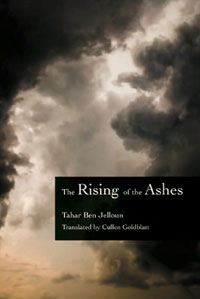Remembering the Dead

North African expatriate writer Tahar Ben Jelloun (The Blinding Absence of Light) is well-regarded in his adopted home of France (awarded a Prix Goncourt in 1987) and around the world, having garnered an International IMPAC Dublin Literary Award in 2004 (one impressive aspect of this award is that the long list of nominees is assembled by polling those unacknowledged legislators: librarians). He is a novelist, essayist, journalist, and, no small thing, an engaging polemicist. Having his fiction on my bookshelves and thus some passing familiarity, I had not known Ben Jelloun to engage in poetics.
A shameful gap in my cultural literacy or something else? No matter. The estimable publisher City Lights has offered up a bilingual edition of The Rising of the Ashes (translated from the French by Cullen Goldblatt.) It is interesting how the substitution of a preposition (“of” instead of “from”) powerfully shifts the meaning of the title. Appropriately so, as this slender volume contains two long (or as some like to say, epic) poems, one focused on the first (U.S.-engaged, aka Desert Storm) Gulf War, and the second on the horrible events coincident with the Israeli invasion of Lebanon in 1983 and the genocidal involvement of the IDF (events effectively recounted in the brave Israeli film and graphic novel Waltz with Bashir).
Cullen Golblatt’s Translator’s note offers this conclusion:
The Rising of the Ashes
In a preface to the two poems, Ben Jalloun declaims:
In a bow to a quote often attributed to Edmund Burke1, Ben Jalloun explains his motives:
I came to poetry through the urgent need to denounce injustice, exploitation, humiliation. I know that’s not enough to change the world. But to remain silent would have been a kind of intolerable complicity.
(Silence.)
1”The only thing necessary for the triumph of evil, is for good men to do nothing.”
